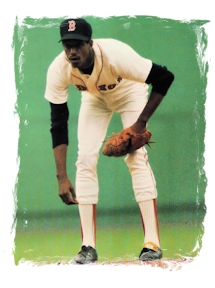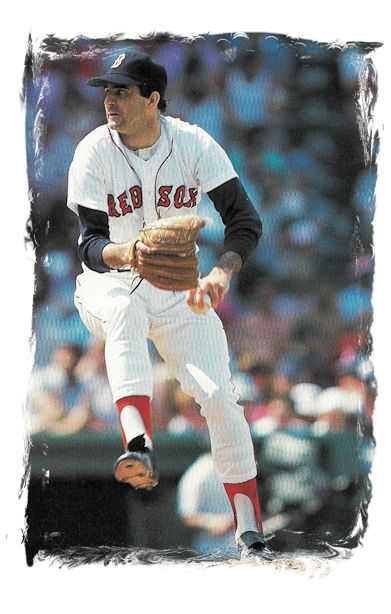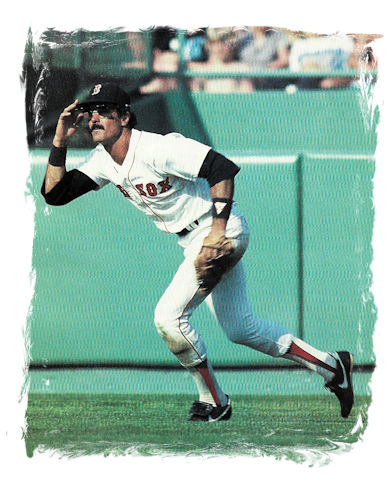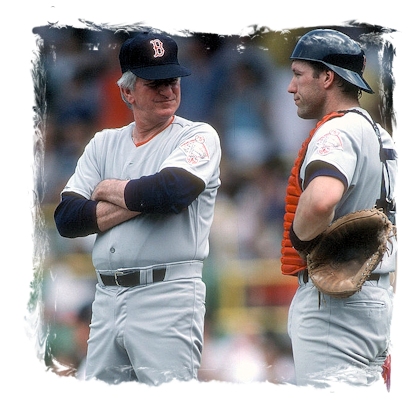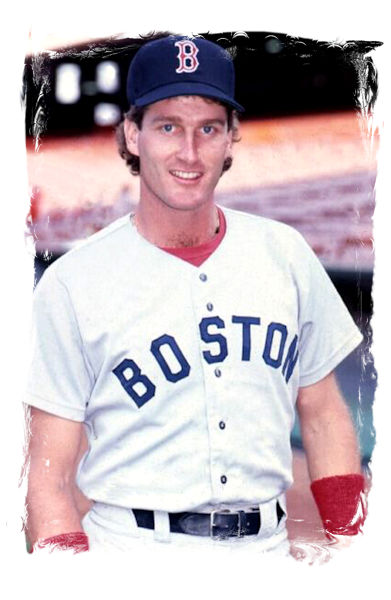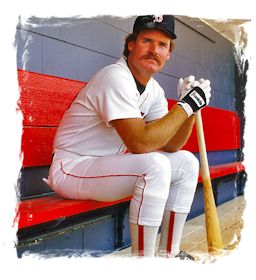|
1985 BOSTON RED SOX ...
It was a time of change at Fenway Park in 1985. Ralph Houk had ably managed the team the previous four seasons, and produced three winning records, despite presiding at a time when the team’s roster was mostly in transition. He retired and John McNamara replaced him. On January 14th, the Sox signed free agent pitcher Bruce Kison for $370K. On March 4th, Roger Clemens, who was overcoming off-season shoulder surgery to remove cartilage fragments from his rotator cuff, signed a new contract for $140K. Al Nipper reported to spring training early but soon noticed that he was quickly fatigued from working out. An examination by the team physician, Dr. Arthur Pappas, revealed a low blood count and fears rose that the pitcher might have leukemia. Nipper was eventually diagnosed with a serious stomach ulcer and anemia and missed almost all of spring training. Rookie outfielder, Kevin Romine who led the International League in RBIs was the sleeper at spring training, hoping to get a reserve outfielder spot. Another young player who was impressing McNamara with his versatility, playing various positions, was Steve Lyons. Lyons spent many hours working with Red Sox hitting coach Walt Hriniak. Hriniak advised the young man to be more patient, saying Lyons was “a hyper, aggressive kid who naturally jumps at everything. … He’s got to learn to wait on the ball.” But Hriniak had no doubt Lyons would become an asset to the Red Sox, even if he never became a power hitter. “[Steve] is someone you want on base. You want him to get as many hits and walks as he can because … when he gets on the bases, he makes things happen.” Hriniak’s tutelage seemed to help: By late March, Lyons was hitting .342 and finally showing the potential to handle major-league pitching. Steve Crawford was impressive in spring training, pitching 11 shutout innings at the start. The once-promising prospect, now 27 years old, knew his role would be a middle reliever. Gary Allenson had been granted free agency in November and it appeared that Marc Sullivan had a good shot at making the squad as the number-three catcher. Jeff Newman, the presumed number two, was released, and McNamara decided to start the season with three catchers — Rich Gedman, Sullivan, and Dave Sax, signed as a free agent from the Dodgers organization where he had hit a cumulative .307 in the last three years at Triple-A Albuquerque. The Sox played the Dodgers toward the end of March, and Dodgers players tried to help Dave Sax while Jeff Newman was catching. However, Dave's brother, Steve, stole second and third base and already had stolen 5 of 7 against Newman. Steve’s late steals were interpreted as an attempt to embarrass Newman and enhance Dave’s bid to stick with the Red Sox as a backup catcher/first baseman, which he was already likely to do. Newman never played in a regular-season major-league game again. In the end, cut and sent to Pawtucket, were Romine, slugger Sam Horn and outfielder Mike Greenwell. New to the Sox roster were Lyons, Sullivan, Sax, and pitcher Mike Trujillo.
The season started in the best way possible, a three-game sweep of the New York Yankees at Fenway Park. On Opening Day, April 8th, "Oil Can" Boyd shrugged off two second-inning runs and opened the season with a good performance. He and Bob Stanley held the heart of the Yankee order, the second through fifth positions, to a harmless single in 14 at-bats, while the heart of the Red Sox attack battered Phil Niekro and successors for three homers, six hits, six RBIs, eight runs scored and 14 total bases in a 9-2 rout. Mike Easler contributed two singles, a walk and two runs to the pounding. Dwight Evans hit a towering homer, doubled, walked, and scored three runs. The first pitch Tony Armas swung at, was sent screaming into the screen for a two-run homer. Then there was Jim Rice, who snapped his bat at a pitch and sent it whistling into the center field bleachers. In the second game of the opening series on April 10th, Rich Gedman collected four hits as the Red Sox battered the Yankees, 14-5. The sweep was completed on April 11th, as Roger Clemens, who was far from sharp, threw 135 pitches in just six innings. But he settled down after falling behind, 2-0, in the second inning, and then kept the Yankees in check until Bob Stanley could shut the door for a 6-4 win. The Sox won their fourth in a row, 7-2, over the Chicago White Sox before a chilled Fenway crowd on April 13th. Boyd gained his second straight victory, going the distance, spacing five hits, and afterward announcing his candidacy for this year's All-Star team. The "Can" was something to behold again, retiring the last 13 batters he faced. Four straight wins were followed by four straight losses, the Sox broke out of their trance in Kansas City, with a 4-3, 14-inning victory over the Royals. Jim Rice's solo homer was the difference. On April 20th, the Sox beat the White Sox in Chicago, 12-8, thanks in large part to Marty Barrett’s first career grand slam. At Yankee Stadium on April 23rd, the Sox pulled out another extra-inning win. They won this game, 5 to 4 in the 11th inning when Dwight Evans drove in Barrett with the winning run. The next night, on April 24th, a Jim Rice homer put the Sox out front, 7 to 6, after twice blowing the lead. The Sox's last win of the month happened on April 26th back home at Fenway. After stranding ten men on base, the Sox used four errors by the Royals, to win 5 to 2. They finished the month by losing four straight, going 9-11 ending up in fourth place, four games out of first.
The new month started with Roger Clemens getting beat up by the Mariners in Seattle, 7-0. Al Nipper won a pitcher's duel the next night. On May 2nd, he beat Seattle 2 to 1, with some help from Bobby Ojeda and Bob Stanley. The Sox 2-3-4 hitters didn't help, going 3-for-47 in the two games. A awaited explosion came in Oakland on May 3rd, as Jim Rice and Mike Easler each cracked two-run homers to highlight a seven-run fifth inning and sent the Sox on their way to a 10-0 victory. With "Oil Can" Boyd on the mound, they got a 1-0 lead from Bill Buckner’s homer and then came on with vengeance against the lowly A's, who had lost eight of their last nine games. The Sox pounded out 14 hits, including nine for extra bases.
Wade Boggs had three hits, including two doubles, to extend a hitting streak to 11 games. Tony Armas came through for two hits and broke an 0-19 slump. Not to be lost amid the offensive barrage was the performance of Boyd, who went the distance for the shutout and recorded 12 strikeouts along the way. Back at Fenway on May 7th, it was Roger Clemens' turn, winning 6 to 4 over the Angels. He struck out five batters in the first three innings while being staked to a 3-0 lead. Bruce Kison was activated from the 21-day DL and Steve Crawford went on the DL with a muscle tear in his forearm. And Jerry Remy was scheduled to undergo his sixth knee operation. "Oil Can" Boyd pitched a 6 to 1 beauty against the Angels, the next night, May 8th. It was his fourth victory in five decisions. Tony Armas helped by belting his eighth homer. At the same time, commissioner Peter Uberroth announced that he was implementing a drug testing program for all MLB players. The Red Sox pulled out a 10th-inning win on May 10th, beating the A's, 5 to 4. Bill Buckner doubled and was driven home by Reid Nichols. It gave the Sox six wins in their last seven games. Unfortunately, the Sox then lost seven of their next eight. Their one win came on May 17th, with Roger Clemens shutting out the Indians, 5 to 0, and striking out ten batters. The next win came four days later on May 21st. Bruce Kison, making his second start of the year, was masterful in beating the Twins in Minnesota, 9 to 1. The Sox belted out 16 hits, including four by Marty Barrett and homers off the bats of Dwight Evans and Tony Armas. Another win came the next night on May 22nd. Clemens pitched seven strong innings, allowing just two hits, before Bob Stanley almost gave it all back with a 4-1 lead, holding on to win, 4 to 3. The Sox next went into Texas and lost four straight. On May 27th, Steve Lyons got his first start, once again as a result of an injury to Tony Armas, who had sprained his wrist. Lyons made the most of that opportunity, hitting two home runs and driving in four runs in a 9-2 win over the Minnesota Twins. Red Sox fans, loved Lyons' aggressive and enthusiastic style of play. It even earned him the nickname “Psycho,” referring to his at times eccentric behavior, and his willingness to call attention to himself. After having just one run to work with in his previous 18 2/3 innings, "Oil Can" Boyd received great support as he and his companions blackjacked the Minnesota Twins, 7-0, over in Kenmore Square on May 29th. Boyd took care of the opening, after giving up singles to Kent Hrbek and Tom Brunansky in the first inning with two out, he quickly took stock of himself. What resulted was a strikeout of Randy Bush to end the inning and enough overpowering pitches to limit Minnesota to just one hit over the next six innings. The Sox walked away with an 11-inning, 9-7 victory on May 30th. Glenn Hoffman raced home with a head-first slide on a single by Jim Rice for the win.
Bruce Kison, with some relief help from Steve Crawford, started the month by shutting out the Rangers at Fenway, 6 to 0 on June 1st. Rich Gedman's first career grandslam made it all possible. They were in sixth place, 9 1/2 games out, but it was the start of a winning streak that saw the Red Sox win 14 of their next 15 games and get to within 2 1/2 games from the top. Then, what happened in the Red Sox' 12-3 victory over the Texas Rangers on June 2nd, would have been considered a miracle the week before, when the Sox were swept in Texas and came home with much of their confidence gone. But it was no miracle that the hard-luck Bruce Hurst turned himself around after eight straight winless outings or that the Red Sox exploded for a season-high 18 hits. Hurst threw 137 pitches and left after eight innings, nothing like the man who had gone 2-10 in his 19 previous starts and had a 6.30 earned-run average. Jim Rice's bat came alive for four hits, including his 10th home run of the year. After a 6-5 victory over the Cleveland Indians on June 3rd the Sox' sixth in their last seven games, "Oil Can" Boyd (6-4) was showing that he was a mature pitcher, using his energy and learning what it takes to win. The victory was the 11th time Sox had come from behind to win. They were now 14-9 at home and 4-0 against AL East teams. Rich Gedman had a hitting streak that reached 13 games (18 for 49, .367), a career high. Bobby Ojeda went out and pitched seven innings of a 5-0 shutout over the Indians the next night on June 4th, adding his name to the list of pitchers whose strong performances pushed the Red Sox to the .500 mark. It was one thing to tear apart Texas and Cleveland, a pair of last-place clubs, but on June 7th the Sox hammered the Baltimore Orioles, 8 to 4. Behind Al Nipper, Sox batters banged out 14 hits, including four from Rich Gedman (.323 BA), who extended a hitting streak to 15 games. When Marc Sullivan was placed on the disabled list, Dave Sax was recalled from Pawtucket. Rich Gedman sprained his ankle, so on June 8th, Sax found himself starting, as the catcher for Bruce Kison against the Baltimore Orioles. The Red Sox won, 2-1, and in the fourth inning, Sax’s first major league hit advanced the winning run from second to third. "Oil Can" Boyd pitched a three-hit shutout to sweep the Orioles in Baltimore, winning 12 to 0, on June 9th. It was the "Can"'s third shutout of the year On June 10th, the Sox, on their last chance of the evening, parlayed fantasy, fortune and ferocious determination into a three-run rally on a three-run Jim Rice homer into the screen that gave them a 4-2 victory over the Brewers, running their winning streak to eight games, extended their overall surge to 11-1 and pulled them into a third-place tie, 6 1/2 games behind front-running Toronto. The Brewers became their ninth victim in the last ten games on June 12th with a 7-2 victory, as the Sox quietly and with precision primed themselves for an early-season showdown with the first-place Toronto Blue Jays. In Thursday’s opener, on June 13th, the Sox trailed the Jays, 6-2 in the fifth inning. Wade Boggs then hit a two-run homer to cut the deficit in half and then later walked and scored in a rally that pushed the Red Sox to an 8-7 win. On Friday, June 14th, "Oil Can" Boyd scattered 11 hits, going the distance in a 4-1 win over the Blue Jays. Saturday’s game, on June 15th, was a pendulum of emotions. The Red Sox first coughed up a 5-1 lead in the eighth, then immediately scored twice. The winning rally came thanks to four walks, with Rich Gedman and Marty Barrett drawing free passes with the bases loaded. The Sox won 7-5.
One more rally was ahead on Sunday, June 16th. Trailing 6-3 in the eighth, the Red Sox scored four times. Glenn Hoffman tied the game with a two-run single and Dwight Evans won the game with a sac fly. The Sox were soaring, within 2 1/2 games of the lead and heading to face the Tigers, who were also tied with them in second place. And just when you were ready to say this might be the year, the Red Sox immediately did a U-turn back in the wrong direction. They dropped two of the next three in Detroit and three of four in Toronto. Bruce Hurst was the losing pitcher in two of the two losses. As he drove home from the airport on June 23rd, going over the speed limit, he was pulled over on the Mass Pike. After studying his driver's license, the trooper, realizing who he was, engaged him in a conversation and found himself, giving the depressed pitcher a pep talk. Back at Fenway, on June 24th, the Sox briefly righted the ship, beating the Tigers, 9 to 2, behind "Oil Can" Boyd. Boyd walked eight batters and scattered six hits, but pitched out of jams to chalk up a 7-5 win. It was his 10th complete game. But the Tigers shut out the Sox in the next two games, as the Sox batters forgot how to hit. On June 28th, McNamara pulled Hurst out of the bullpen to start against the Orioles. Hurst responded by beating Baltimore, 6 to 1, striking out Fred Lynn three times and Eddie Murray, twice. But the Sox lost the next two games to the O's finishing up the month. The Sox, having lost nine of their last 12 games, were now in third place, 7 1/2 games behind.
Things didn't improve as July started. The Sox lost two of three in Milwaukee. In their one win on July 3rd, Bruce Hurst shut out the Brewers, 9-0. He allowed just one walk and struck out a career-high, ten batters. Out on the West Coast, the Sox dropped three of their four games with the Angels. On July 6th, Dwight Evans picked up his 800th career RBI, leading the Sox to their only win, 7 to 5. The low point of Roger Clemens' season came on July 7th when he could not make his scheduled start against the Angels due to what he described as an intensely sharp pain, as if someone stuck a knife in the back of his shoulder. Clemens’ early-career insecurity came to the fore again as he engaged in a clubhouse meltdown in Anaheim that day, and his fear of failure caused him to break down in tears while repeatedly asking, “Why me?” The next day he was placed on the 15-day disabled list and he never recovered fully.
Up to Oakland, where on July 8th, Bruce Hurst was again victorious, beating the A's, 2 to 1. Hurst threw 7 1/3 shutout innings giving way to Steve Crawford. After the A's picked up a run in the ninth, Dwight Evans cut down Carney Lansford at the plate with, what would have been, the tying run. The next day, July 9th, the Sox scored three runs in the ninth inning to squeak by the A's, 6 to 3. Reid Nichols hit a home run in his final at-bat as a member of the Red Sox on July 10th, against the Oakland Athletics, joining Ted Williams among others who achieved this feat for the team. On July 11th, the Red Sox traded Nichols to the Chicago White Sox for pitcher Tim Lollar. In Seattle on July 12th, down, 4-0, the Sox came back with vengeance, led by Jim Rice with a solo home run in the sixth inning. From that beginning, the Red Sox began to chip away. With Wade Boggs on base in the eighth inning, Bill Buckner slammed a two-run homer to make it a 4-3 game. Then, in the ninth, Rich Gedman hit a solo home run, tying the game and setting the stage for a game-winning base hit by Boggs. In the ninth, Boggs came to the plate with runners on first and third and two out. He delivered the Sox to a 5-4 win. Mike Trujillo won his second game in relief of Bruce Kison, pitching two innings to keep the Red Sox close before the late-inning fireworks. The Sox concluded the first half by beating the Seattle Mariners on July 14th, behind "Oil Can" Boyd (11-7), who was not chosen to be in the All-Star Game. The "Can" was bound and determined to show American League manager Sparky Anderson that he could be impressive. He didn't get his 12th complete game, but he did strike out seven batters in 7 2/3 innings without walking any. The All-Star game was played on July 16th in Minneapolis at the Metrodome. The National Leaguers ran away with a 6 to 1 beat down of the American League. Jim Rice started in left field and went 0-for-3, but played the whole game. Wade Boggs came in to play third and drew a walk and Rich Gedman got in as the third catcher of the game and was 0-for-1 at the plate.
The Sox were 45-42 and had fallen back 7 1/2 games. But they started the second half with a bang on July 18th at Fenway. They scored two unearned runs in the second, then exploded for eight in the third inning. Bruce Hurst accepted the gift and wrapped up the 10-1 victory with a seven-hitter, in which just one California Angel batter reached second base until the ninth inning. Hurst was now 4-0 with a 1.56 earned run average, since seizing the opportunity to regain his place in the rotation. Rich Gedman (.306 BA) hit the screen for his fourth hit of the game and seventh homer in the seventh, to give the Sox an 8-2 win over the first-place Angels on July 21st, earning them a series split. Tim Lollar, after not pitching for 17 days, was called into action on July 22nd to fave Oakland. With help from Mark Clear and Bob Stanley, he won, 6 to 4. After the game, he was serenaded on a toy saxophone by "Oil Can" Boyd. Wade Boggs got four hits and was on a 25-game hitting streak, batting .344 Bruce Hurst struck out eleven batters when he beat the A's, 3 to 2 on July 23rd. He was now considered the "ace" of the Sox staff, after finding that no other team wanted him, when the Red Sox had tried to trade him, only a few weeks before. Jackie Gutierrez drew a two-out, bases-loaded walk in the ninth inning to force home the winning run as the Red Sox completed a sweep of the Oakland A's, 6-5, at Fenway Park on July 24th. Bill Buckner followed by pulling his 11th homer into the grandstand in right, putting him five homers short of his career. On July 25th, Wade Boggs extended his streak to 28 games and scored the first Sox run, in a 5 to 3 win over Seattle. The streak was stopped the next night but the Sox won their sixth straight by beating the Mariners, 6 to 2 on July 26th. Al Nipper breezed through six innings, allowing just two base hits. After losing the next three, in lousy weather against the White Sox on July 31st, Dave Sax's sacrifice fly in the seventh inning tied the game at 1-1, after which it was called after a downpour had soaked the outfield. The tie broke a streak that dated back to June 8, 1961, and it had been the longest stretch for a team without a tie, in the majors at that time. The Sox went 14-12 for the month and were in fourth place, 10 1/2 games out.
Steve Lyons lined a run-scoring single down the right field line to finish off a two-run ninth-inning rally, in the second game of an August 1st doubleheader with the White Sox at Fenway. In Kansas City, Roger Clemens wore out the Royals' hitters while Bill Buckner clubbed a three-run homer to beat Kansas City, 5 to 4. On August 4th, in Kansas City, Boggs' fourth hit of the game opened the gates for a 6-5 victory in 12 innings over the Royals. He dropped a drag bunt up the first-base line, and with four hits, he pushed his average to a sizzling .354. Boggs' final hit will be remembered, if for no other reason than it was a bunt single. With Dwight Evans on base with a leadoff double in the 12th, Boggs was willing to sacrifice. Instead, he put down a perfect drag bunt that befuddled first baseman Steve Balboni, who had no play. Evans and Boggs both scored moments later on a two-run double by Bill Buckner, his second game-winning hit in as many days. Shortly before 5 pm, on August 6th, the Red Sox team bus pulled up at the Westin Hotel in Chicago. Fifteen minutes later the bus pulled away, leaving all behind except Sox traveling secretary Jack Rogers, publicist Dick Bresciani and coach Joe Morgan. From that moment on, Red Sox players found themselves knee-deep in a baseball strike. While negotiations went on in New York, the Red Sox players officially joined the ranks of the unemployed by following the directives of their union and refusing to go to work at Comiskey Park. During a players-only team meeting, the Red Sox had discussed the merits of a potential strike. Bobby Ojeda dispelled any notions that he went along with the prevailing pro-ownership mood when he said, “I don’t care what you say. They (the owners) are going to try and pay us as little as they can. Yes, if you are older, you don’t want to miss a paycheck being out on strike. But I’m young!” Three months later, he would be traded. The central issues were how much money owners were contributing to the players’ pension fund and the fact they were trying to negotiate a salary cap on salary arbitration awards and whether salary arbitration should take place after 2-3 years or 3-4 years. The strike lasted two days as the owners agreed to drop the cap idea, and contribute $33 million to the pension fund over the next three years and $39 million in 1989. They bumped the players’ minimum salary from $40,000 to $60,000.
On August 8th, in Chicago, the two teams split another doubleheader. Wade Boggs led the way in the second game, driving in three runs with three hits and a 6-1 win in the second game. The Sox next came back to Fenway and were beaten in three straight by the Yankees and the first two games with the Royals, winning the finale by a whopping 16-3 score on August 14th. They banged out 21 hits to end the five-game losing streak. Bill Buckner highlighted the barrage with a grandslam homer. Bruce Hurst was the winner, retiring 19 of the last 21 batters. But the Red Sox then lost five more games before taking one from the Rangers on August 22nd. Mike Trujillo’s third win came, when he worked eight innings, spacing eight hits and two runs on his way to an 8-4 win over Texas at Fenway. On August 23rd, Bruce Hurst and Bobby Ojeda became fathers on the same day. The next day, both babies became celebrities when they appeared on NBC's "Game of the Week" against the Twins On August 24th. If the rumors of friction between Steve Lyons and John McNamara hadn’t been true before, Lyons managed to get on his manager’s bad side with a baserunning blunder in the game. Lyons was on second and Dwight Evans was at bat. Without waiting for permission, Lyons tried to steal third, Evans struck out, and Lyons was easily thrown out, ending the inning in a very close game. McNamara was furious, and it would not be the last time the two would clash. The Sox and Bruce Hurst lost, 1-0. Tony Armas and Bill Buckner each had three hits, when the Sox bombed the Indians, 17-2, in Cleveland on August 29th after losing five straight games. Meanwhile, in Georgia, Roger Clemens got word that he would need surgery to repair his shoulder. This while Al Nipper was out of the rotation with a foot injury. And so the Sox treaded water throughout July and then collapsed in August. They went 8-21 through the month, including seven consecutive losses to the Yankees. The club had struggled and won eight games and lost 20. Relievers blew 32 leads in 28 games, losing 19 of them. They were in fifth place, 20 1/2 games back.
If there was hope, it was that the Sox didn’t quit on their manager. The Sox started September by winning nine of the first eleven games they played. On September 1st Mike Trujillo pitched a complete-game 10-3 win over Minnesota. Wade Boggs went 11 for 20 in the four games with the Twins, raising his batting average to a league-leading .362 Tim Lollar threw a two-hitter at the Rangers, over six innings in Arlington, on September 2nd. Bill Buckner had four of the Sox's 19 hits in the 11-2 victory. The Sox won again the next night, 7-5, on September 3rd. The Sox had 12 hits including four by Jim Rice, who drove in three of the runs. Bruce Hurst won his tenth game, striking out ten batters. Mike Greenwell made his major-league debut as a pinch-runner for Jim Rice in the second game of a September 5th doubleheader against Cleveland at Fenway. The Sox won the opener 13 to 6 behind Mike Easler's grandslam homer. Dwight Evans had two solo homers in the game. Jim Rice had three hits and had gone 12-for-18 in the last four games. On September 7th, they took two games in a doubleheader with the Indians, 11-9 and 7-4, unleashing 15 hits in each game. Glenn Hoffman's homer in the second game was a Red Sox club record of hitting 23 homers in 14 straight games. Tim Lollar pitched his first complete game of the year on September 8th, beating the Tribe, 8 to 1, giving the Sox their fourth win in five games against Cleveland. Wade Boggs (.362 BA) continued his hot hitting. He reached the 200-hit plateau for the third time in his four-year career on September 10th with a six-hit performance in a doubleheader split with the Orioles. In Milwaukee, the Sox took 3-of-4 from the Brewers. Dwight Evans' 11th-inning homer lifted the Sox to a 10-8 win on September 14th. Jeff Sellers jumped up from Double-A New Britain, to win for the Sox over the Brewers on September 15th, 4 to 2. The Sox came from behind to beat the Blue Jays 3 to 2 on September 17th. Tony Armas's three-run homer gave the Sox a 6-5 victory. The Sox pummeled the Blue Jays for 18 hits on September 18th at Fenway. They were led by Rich Gedman, who hit for the cycle, driving in seven runs, and Wade Boggs (.372 BA) who went 4 for 5. With two more of his classic line-drive singles, Boggs became the top single-season Red Sox hitter on September 21st. He surged past Tris Speaker's single-season record of 222. His two hits on September 22nd gave him 69 multiple-hit games, tying the club record set in 1979 by Jim Rice. He also was in a nine-game hitting streak where he was 20 for 40. "Oil Can" Boyd got his 15th win when he beat the Tigers, 6 to 2 on September 22nd. Mike Greenwell’s first hit in the big leagues was a two-run homer on September 25th at Toronto. The 13th-inning round-tripper won the game, 4-2. Greenwell hit another two-run blast the next night, on September 26th. The Sox beat the Blue Jays 3 to 1 with Jeff Sellers going the distance and allowing just three hits. Bobby Ojeda shut out the Tigers, 2 to 0 on September 28th. Dwight Evans and Glenn Hoffman each connected for solo homers to get him the win in the 10th inning. On September 29th, Bruce Hurst struck out nine Blue Jays batters, setting a team record for left-handed pitchers, three more than Dutch Leonard's 176 Ks in 1914. Wade Boggs picked up four hits, giving him a season total of 232, the most in the majors since Rod Carew had 239 for Minnesota in 1977. It was his seventh four-hit game. Additionally, with a walk added to those four hits, he had now reached base 329 times, passing Norm Cash (326), and the most since Ted Williams reached 358 times in 1949.
Mike Greenwell slugged a solo homer on October 1st at Baltimore. His first three hits in the majors were all homers. Wade Boggs' single on October 4th tied Al Simmons' 60-year-old American League record of hitting safely in 133 games. He won the American League batting title with a .368 average, for the second time in three years, ending the season going 3-for-4 on October 6th. The three hits on the final day of the season, gave him a total of 240, sixth-best in AL history and the most in the majors since 1930. The number surpassed Tris Speaker's 222 hits as the Sox team record. Boggs' 72 multiple-hit games was also a team record. Boggs had more hits in one season than any third baseman in major league history, banging out 187 singles, which was seven more than the AL record set in 1980 by Willie Wilson. Boggs hit safely in 135 games, tying Chuck Klein's major league mark, which was also set in 1930. On May 25th, Boggs' average was only .281, and over the remaining 120 games, his bat sizzled at .396 Hitting in front of Bill Buckner, Jim Rice and Tony Armas as the table-setter, he also scored 107 runs, having scored more than 100 over the last three seasons. The Sox played hard through September and finished a neutral 81-81, in fifth place, 18 1/2 games behind the Blue Jays. It was a good sign that McNamara didn’t lose the clubhouse in the bad times. The third-highest-scoring offense in the AL was offset by the league’s most porous defense and the Red Sox slipped to fifth place. They had the third-best offense in the American League, and unlike previous Red Sox teams, this wasn’t done with power. They had the top batting average in the league, and the top on-base percentage, with third baseman Wade Boggs leading the way. Boggs hit .368 and produced an OPB of.450 and knocked out 240 base hits. Rich Gedman, the 25-year-old catcher, was coming into his own, registering career highs in batting average (.295), hits (147), doubles (30), triples (5), runs scored (66), walks (50), and RBIs (80). He led all catchers in assists and threw out 53 of 122 would-be base-stealers (43 percent). Catcher, Dave Sax played only 20 games with Pawtucket, though only two more than that with the Red Sox. Still, that would represent the most action he’d see in any major league season. He had 43 plate appearances scattered across those 22 games but hit an admirable .306. Bill Buckner batted .299 with a career-high 110 runs batted in. He finished the season strongly, getting 16 hits and three home runs while driving in 11 runs in his last six games. His 201 hits for the season broke Jimmie Foxx’s 49-year-old franchise record for hits in a season by a first baseman. The same was true for Marty Barrett at second, with his .336 OBP. Barrett’s batting average dipped to .266 but he had a .987 fielding percentage and 56 RBIs to his credit. His lifetime fielding percentage was .986. Glenn Hoffman and Jackie Gutierrez shared shortstop duties. By the end of April, Gutierrez was only batting .211. He raised it 30 points by the end of May but suffered a strained tendon behind his knee, and Hoffman filled in. By June, Hoffman had pretty much won back the starting role, though when he was injured in late July, it was Gutierrez back at the position for most of August, only to yield it to Hoffman once again in early September. Gutierrez was 0-for-24 from August 31st until the end of the season. By season’s end, Hoffman had played in 96 games with 321 plate appearances. Gutierrez got into a few more games (103) but came to the plate less often (297). Hoffman hit for a much higher average, .276 to .218 for Gutierrez (.343 to .250 in on-base percentage). He drove in 34 runs to Gutierrez’s 21. Hoffman committed 11 errors in 400 chances, compared to 23 in 404 chances for Gutierrez (20 of them in his last 48 games). Jim Rice and Dwight Evans were still producing at the corner outfield spots, combining for 56 home runs and 181 RBIs. The disappointments on offense were the decline of designated hitter Mike Easler and centerfielder Tony Armas. Like the rest of the Red Sox, Easler’s power numbers dipped considerably. He hit .262 with 16 home runs and 74 RBIs in 155 games, primarily as a designated hitter. Tony Armas was limited to 103 games; his production declined sharply to 23 homers and 64 RBIs. Along with injuries, his problem was not getting on base and not going deep. Therefore, he ended up sharing time in centerfield with Steve Lyons. Lyons had become a fan favorite. Despite not playing regularly (he appeared in 133 games), he hit .264, with 5 home runs and 30 RBIs. Although he mostly played center field, he showed his versatility by playing some innings at third, short, right field, and left field. After the season the Boston Baseball Writers Association named him the Red Sox "Rookie of the Year", and he was also given the "Tenth Player Award". In his final season, Red Sox Player Rep, Rick Miller played in only 41 games and hit .333 in 45 at-bats. Pitching was generally the problem in Boston through the early part of the 1980s. There were clear signs of progress. The staff was by no means the team strength, but at sixth in the AL with a 4.06 ERA, they weren’t bad. "Oil Can" Boyd won 15 games with a 3.70 ERA and young Roger Clemens endured nagging injuries on his way to a 7-5 win-loss record and a 3.29 ERA sophomore campaign. Bruce Hurst’s season-ending struggles from 1984 continued in 1985. By the end of May, he was 1-4 with a 6.36 ERA and soon lost his spot in the rotation. The Boston media and fans, as well as the Red Sox front office, vented their frustration over an underachieving club at Hurst. He was described as an enigma, a mystery, different, fragile, and not tough enough to be a front-end starter. Hurst demanded a trade, and the Sox openly shopped him. Defying expectations, he turned his season around. From June 28th through the end of the season, he was a completely different pitcher. He won 9 of 15 decisions and suddenly transformed into a strikeout pitcher, whiffing 10 or more batters for the first five times in his career. He struck out ten or more in five different games and established a new Red Sox record for lefties with 189 strikeouts, the most since Luis Tiant struck out 206 in 1973. That went along with his 11 wins (13 losses) in 229 1/3 innings. Physically weak from his anemia ideal in the spring, Al Nipper struggled as the season got underway, losing five of his first six decisions with a 5.40 ERA through May. He seemed to reach his stride in June, winning three straight starts (two of which were complete games) but then developed serious back spasms. As they worsened in July, Nipper was hospitalized and placed in traction. Nipper finished with a 9-12 record and a 4.06 ERA and surrendered 82 walks in just 162 innings. John McNamara moved Bobby Ojeda to the bullpen, not as a punishment, but to groom him as a closer. The experiment was short-lived as the starting pitchers were failing and Ojeda was returned to the rotation. For the season, he went 9-11 with an ERA of 4.00. Bruce Kison finished his career in 1985. His importance to the club transcended his five wins and 92 innings. McNamara praised the 35-year-old Kison’s positive influence on his young staff. After years of battling injuries, Kison retired after the season when he was diagnosed with a torn rotator cuff. Mike Trujillo (4-4, 4.82 ERA) was inserted into the Red Sox starting rotation when Kison came down with a hamstring injury. Slotted as the fifth starter, Tim Lollar went 4-5 in his first 10 starts. He was shunted to the bullpen for the rest of the season and finished with a combined 8-10 record and 4.62 ERA in 150 innings. Rob Woodward, a September call-up, was a success with a 1-0 record, 26 2/3 innings pitched, and an ERA of 1.69. It was the bullpen that completely lacked depth. Bob Stanley had his usual good year, posting the team's lowest 2.87 ERA in 87 2/3 innings with ten saves. Mark Clear performed durably in 41 games, with a 3.72 ERA, and 55 strikeouts in 55 2/3 innings. He was used in just six save situations, saving three and blowing three. Steve Crawford was used as a long reliever and spot starter for the first three months of the season. When Bob Stanley needed surgery on his index finger, McNamara turned to Crawford, who responded by leading the club in saves with 12. He also posted a 6-5 record with a 3.76 ERA, pitching in 44 games despite two trips to the disabled list.
|



